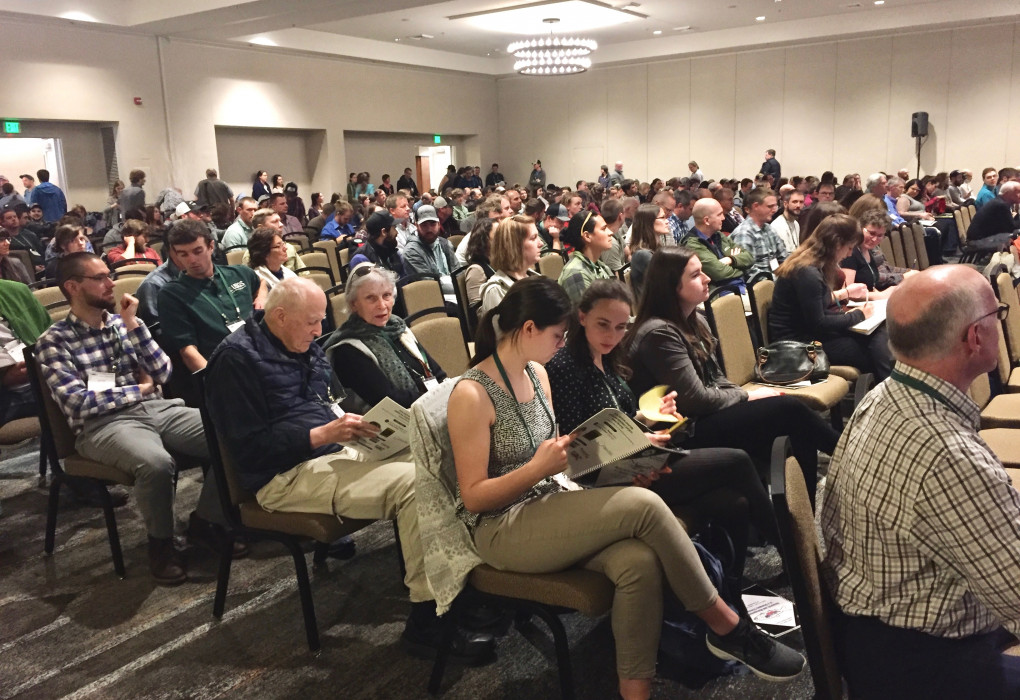American Fisheries Society- Oregon Chapter meeting 2018
Every year, the American Fisheries Society , a membership based organization for fishery professionals, puts on chapter based meetings throughout the United States. This year, at the Oregon Chapter meeting in Eugene, talks focused on fisheries research and management in a changing climate. As president-elect Kristen Homel noted “We typically think about changing climates in a scientific context. However, socioeconomic and political climates are also changing, and these can have profound effects on fisheries research and management.” To address the multifaceted landscape of fisheries management the plenary sessions focused on both the physical and social aspects of climate change.
On the ecological side, Dominique Bachelet, demonstrated how attendees could use the tools she has created to analyze and plan for climate change: www.climatewizard.org, www.climateconsole.org/conUS, www.landscapesim.org. She also showcased an amazing artist who is working to communicate the effects of climate change through watercolors.
On the social side, Kelly Biedenweg, provided an alternate perspective, focusing instead on the changing human environment such as the reduction in the proportion of rural residents, changing political affiliations, and the changing racial demographics within the state of Oregon. Biedenweg argued that as these trends change over time the values, beliefs, attitudes, intentions, and behaviors of our community will also change. She uses a variety of tools from psychology, anthropolgy, sociology, and other diciplines to help resource managers better understand and integrate social sciences into natural resource management.
Thereafter 20 concurrent sessions played out over the next two days ranging from resilience thinking in salmon management to diversity, equity, and inclusion, to policy and advocacy. In total, 164 people gave presentations, giving their questions, challenges, and insights to fisheries throughout the world.
Three specific talks stood out:
- Nate Mantua talked about the climate contributions to hard times in Salmon Fisheries. In total he estimated that the West Coast troll Chinook Salmon Catch is 10% of its historical size. Federal fisheries disasters in that fishery were filed in 1984 and 2017, both years which followed extreme climatic temperatures and prolonged drought. Through our society's heavy reliance on hatcheries we have experience increased covariation among stocks and the result has been volatility in populations coast-wide. The question pondered, is how can we focus on increasing resilience through diversity-- can we rely less on large production hatcheries?
- Jason Younker gave an eloquent presentation on the first salmon ceremony. Through his experience as a Coquille Tribal member, and as someone who studies anthropology, he encouraged us to give thanks to the salmon, and to ask for forgiveness when catching, coking, sharing, and returning salmon: “Not only is it good to be thankful for your gifts that you have been given by nature, but you are less likely to abuse them in the future if you give thanks for those things”. First Salmon Ceremonies are cultural practices rooted in sound native science, which view salmon to be the cousins of people. These traditions have been conducted throughout salmon nation since time immemorial.
- Kalyn Hubbard presented on the fish parasite C. shasta, in the Deschutes Watershed. In the Deschutes, the parasite is present throughout the basin, but there is considerable spatial and temporal variation in the abundance of C. shasta. The parasite is thought to be a large contributor to prespawn mortality in adult fish, and to have a negative effect on juvenile fish survival. The largest signal in the basin comes from around Cline Falls. Due to the findings of this study, 8 sites will be sampled in 2018 to obtain a higher resolution map of sources of C. shasta. These data will be aligned with salmonid migration to investigate whether parasite genotype abundance corresponds with the life history of its salmonid host.
Save the date for the 2019 Oregon American Fisheries Society Meeting at the Riverhouse in Bend, Oregon, Tuesday March 5th through Friday March 8th. It’s a conference full of good people and is worth attending.

